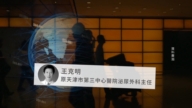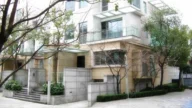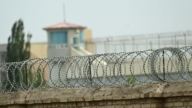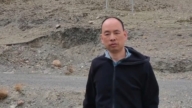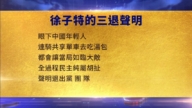【新唐人2011年6月10日讯】说起非正常死亡,大家都知道,但是,提到非正常活着,就很少有人关注了。旅澳作家齐家贞,首次提出了非正常活着的概念,并用她自己苦难的人生经历进行了诠释。她在第二部自传体小说《红狗》中,将非正常活着的状态活生生的呈现给读者。
齐家贞书中讲述的是,她背负着“反革命”罪名,以“劳改出狱犯”的身份,在中国重庆艰难生活的经历。
齐家贞:“(有一次)在梦里面,我就看到一个人,他把一条小白狗的皮,活活的剥光,那个鲜血,把这个狗染成了一个红肉球,它痛得周身颤抖不停,眼睛里含着泪,这个时候,我就吓醒了。等我醒来,我一想这只红狗,我就觉得,我就是这只红狗,因为没有死,只得活下去。”
齐家贞生于1941年,1961年高中毕业时,怀着做“中国的居里夫人”的梦想,卖自己的血、卖母亲的浪琴表,两次去广州寻找出国留学的门路,结果,她和父亲一起,被中共以叛国投敌的“反革命集团罪”判处重刑。
齐家贞:“《红狗》书里面所讲的这些人,都是非正常活着的。我们这个非正常是指的受到政治压力,政治迫害,是国家用政权的力量迫使你成为非正常活着的人。”
1971年,出狱后的齐家贞,不但没有重获自由的感觉,反而觉得又掉进了一个铁幕似的大监狱中。她几乎被剥夺了一切权利,丧失了作为人的高贵与尊严。齐家贞形容,那是比牢房里的日子更为艰辛、复杂、令人心碎的生活。
齐家贞认为,中共造成八千万中国人“非正常死亡”,这当然是滔天大罪,是人神共咀咒的,应该要讨回公道。但是对于那些在中共的迫害下,没有死去的人,也应该关注。
她说,“非正常活着”的人,也是中共建政后的滔天罪行,“非正常活着”的苦难不应该仅仅因为他们还活着,就视而不见。特别是在数字上远远超过八千万,因为只要有一个人“非正常活着”,许多被他连累的人也都会因为他而“非正常活着”。
这个“非正常活着”的概念提出后,引起了海内外许多中国人的共鸣,他们由此开始,对中国人的非正常生活状态进行反思。
中国异见学者焦国标说:“非正常活着”这个概念非常重要,很生动的,很实在的反映了中国社会老百姓的生存状态。他认为,全中国正常活着的人没有几个,大跃进时期,非正常死亡(饿死)的是三千多万,与此同时“非正常活着”的不止是这个数字的十倍八倍。“文革”“非正常死亡”两千万,与此同时的每一个中国人都“非正常活着”。
他说,当前,全中国几百万的访民,几千万的法轮功修炼者,几千万的地下教会信徒,上亿的农民工,全都是在“非正常活着”;海外的流亡者,天安门母亲,刘晓波、高智晟、陈光诚、胡佳、冯正虎、小乔等等,没有一个是正常的活着的。
澳大利亚作家阿木则说,“从时间上说,中国大陆不止是一代人,而是几代人都“非正常活着”。从空间上说,海外的许多华人,包括我自己,也在“非正常活着”,至少有相当的时间在“非正常活着”。”
也有评论认为,在中共政权高压下,中国人在“非正常活着”,而在中国与世界关系千丝万缕的今天,“非正常活着”的恐怕并不只中国人。
新唐人记者梁珍、周玉林、薛莉采访报导。
“Red Dog”: Unnatural Life
Everyone knows about unnatural death, but few
pay attention to “unnatural living." Australian writer
Qi Jiazhen proposed this idea of unnatural living
and explained it with her painful life experiences.
In Qi’s book, “Red Dog" she described her agonizing life
in Chongqing, China after been sent
to a labor camp for been a “counter-revolutionary."
Qi Jiazhen: “(Once) in a dream, I saw a person stripping
the skin of a live white dog. Blood turned the dog
into a red meat ball, the dog’s whole body was trembling
in pain with tears in its eyes.
After I woke up, I thought about this red dog
and felt that I was that red dog, because I didn’t die,
I continued to live."
Qi Jiazhen was born in 1941. After graduating
from high school in 1961, she dreamed to become
China’s “Madame Curie." She gave blood for money a
nd sold her mother’s treasured watch. She went
to Guangzhou twice, trying to go abroad. Qi Jiazhen
and her father were labeled a “counter-revolutionary"
and punished for treason.
The people described in “Red Dog" live
unnatural lives. “We were suppressed and
prosecuted for political reasons. The regime used
state power to force you to live an unnatural life."
In 1971, Qi was release, but didn’t regain freedom.
She felt as though she had fallen into a bigger prison.
Qi was deprived of all rights and lost her dignity
as a human being. Qi said that her life was harder,
more complex and painful than inside the prison.
Qi thinks that the fact the Chinese Communist Party (CCP)
has caused 80 million “unnatural deaths" is a dreadful
crime that should be brought to justice. However,
those who were persecuted
but didn’t die also require attention.
She said that unnatural living was another heinous
crime of the CCP. This crime can not be ignored,
because these people are still alive.
The number of such people way exceeds 80 million.
For every single person living an unnatural life,
those close to him will also suffer unnatural living.
This “unnatural living" resonated among people
in- and outside of China. Many have begun to reflect
on the unnatural living of the Chinese people.
Chinese dissident and scholar Jiao Guobiao said:
“Unnatural living is a very important concept
that realistically and accurately reflects people’s lives
in China. He thinks that very few Chinese
are exempt from an unnatural life.
During the Great Leap Forward, 30 million died
from starvation, but those who lived unnaturally
were more than 8-10 times this number.
During the Cultural Revolution, 20 million died
and every Chinese lived an unnatural life."
He said, at present there are millions of petitioners,
tens of millions of Falun Gong practitioners,
tens of millions of underground Christians,
hundreds of millions of migrant workers,
all living unnaturally; overseas exiles,
Tiananmen mothers, Liu Xiaobo, Gao Zhisheng,
Chen Guangcheng, Hu Jia, Feng Zhenghu
and Xiao Qiao, none of them lives a natural life.
Australian writer Ah MuCe said, in terms of time,
already generations of Chinese live unnatural lives.
In terms of space, many overseas Chinese,
like herself, live unnatural lives for quite some time.
Some also commented that, under CCP’s pressure,
Chinese live unnatural lives, but with China being
so closely connected to the world now, Chinese
might not be the only ones who live unnaturally.
NTD reporters Liang Zhen , Zhou Yulin and Xue Li.






